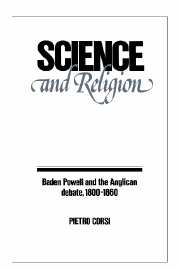Book contents
- Frontmatter
- Contents
- Preface
- List of abbreviations
- PART I
- PART II
- PART III
- The new synthesis and its developments
- 11 The methodology of science
- 12 The Christian apologetic and the fallacies of natural theology
- 13 Christian tolerance
- 14 The parting of the ways: Baden Powell versus Richard Whately
- PART IV
- Bibliography
- Index
11 - The methodology of science
Published online by Cambridge University Press: 15 December 2009
- Frontmatter
- Contents
- Preface
- List of abbreviations
- PART I
- PART II
- PART III
- The new synthesis and its developments
- 11 The methodology of science
- 12 The Christian apologetic and the fallacies of natural theology
- 13 Christian tolerance
- 14 The parting of the ways: Baden Powell versus Richard Whately
- PART IV
- Bibliography
- Index
Summary
The new synthesis of ‘Natural and Divine Truth’ put forward by Baden Powell in 1838 represented his attempt to provide a comprehensive answer to the many philosophical and theological issues debated in the early 1830s. The polemical exchange with John Bowden and the implicit conflict with Whately over the interpretation of the relationship between science and religion, convinced him that fundamental epistemological objections prevented many Anglican intellectuals from accepting the findings of modern science and current geological research in particular.
More than two-thirds of the examples chosen by Baden Powell to substantiate his account of scientific procedures were taken from geology. The reflections on the methodology of science put forward in the Connexion of Natural and Divine Truth were designed to prove that the conclusions reached by geologists on the history of the earth were entitled to the same degree of assent accorded to results of inquiries pursued in other departments of science.
In his answer to John Bowden's criticism of his sermon, Baden Powell warned his colleague that the opposition between the letter of the Mosaic account of creation and modern geology was not an opposition between ‘revelation and any speculation, theories, or inferences of human reason; but a discordance between matters of fact’. As he repeated in his 1838 essay, the stratagem of objecting to geological theories by declaring that the science was still in its infancy represented a serious mistake. Baden Powell was also aware that his failure to convince his Oxford colleagues of the need for academic scientific education was partly caused by their refusal to acknowledge that scientific pursuits were suitable topics for a liberal education.
- Type
- Chapter
- Information
- Science and ReligionBaden Powell and the Anglican Debate, 1800–1860, pp. 150 - 177Publisher: Cambridge University PressPrint publication year: 1988

